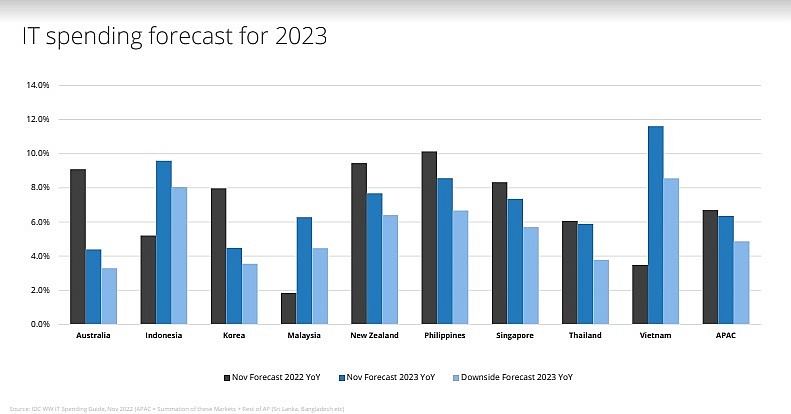Essential digitalisation trends for reducing business costs
 |
The event, which took place in conjunction with IDC, discussed the top tech trends for regional businesses in 2023. Sandra Ng, group vice president and general manager for IDC APJ Research said, “We are getting into this new era as a result of three years of digital acceleration around the world, and the defining characteristics of this new digital era are contextualisation and real-time at scale.”
More than 60 per cent of total spending is coming from digital transformation technologies, Ng added: "When we think about projects that organisations can delay, it would only have to be projected with very low digital business impact.”
Ng shared several predictions at the seminar. By 2027, 80 per cent of organisations will accurately quantify the value of their digital capabilities/assets (data, algorithms, and software code) and significantly improve their market valuation. By 2024, 30 per cent of organisations will have a business continuity crisis management strategy that includes continuous intelligence and enables an agile reaction to future economic shocks and disruptions.
In addition, spending on digital technology by organisations will grow at 3.5 times the economy next year, establishing a foundation for operational excellence, competitive differentiation, and long-term growth, Ng said.
Five trends stood out at the panel event to keep an eye on in 2023.
Pervasive and embedded automation
Organisations are investing tremendously in automation. According to Ng, some AI and automation projects have not delivered up to expectations because “these technologies have been applied, predominantly, in silos.”
She contends that technology has always been a deflator, as organisations use technologies to drive automation, indirectly reducing inflationary pressures.
According to Paul Burton, general manager at IBM Asia-Pacific, automation is becoming increasingly imperative for businesses. "The people entering the workforce don’t have the necessary skills to drive digital transformation forward. That's why automation is imperative," he said.
Burton highlighted business velocity as the key point for 2023. “All CEOs want increased business velocity, which means they need to execute their business processes faster with less variation. That leads back to automation because automation is the only way they can do that,” he said.
 |
| Sandra Ng, group vice president and general manager for IDC APJ Research |
Trust in data
AI, analytics, and big data technologies in Asia-Pacific are growing at 20 per cent on year. However, according to Burton, the only way organisations can keep up with the data deluge is to deploy AI. The successful companies today are those that adapt to their environment the quickest, learn, and then evolve, and that is 100 per cent based on data interpreting and learning from data, he said.
“My advice to any company in any industry, in any country, is to get good data architecture and make sure that you have ubiquitous access to all data in the enterprise so that you can report on it and have a baseline of what your current performance is. And then, as you're making decisions, look to see how those metrics move, and you're either improving or not improving, and you can steer accordingly.”
In 2023, organisations must focus on trust in data. According to IDC’s Ng, at some level, organisations must accommodate data and their training data sets to ensure that it represents society or groups appropriately. “I think there's an issue of policy here and an issue of how we appropriately use technology to ensure inclusion for everybody," she said.
Embedded cybersecurity
The number of online and mobile scams has recently increased throughout the region. All banks have invested significantly in their processes, technology, and people to manage security and comply with the region's regulations. As the public sector and government increase their online and mobile touchpoints with their citizens and the country's residents, there will also be more exposure.
There are several approaches organisations need to focus on in 2023, says Burton of IBM. "Cybersecurity education for employees across organisations is critical. This has to be a continuous process," he said. "Second would be vulnerability assessment, and the only way to keep up with that is through AI or automation. Deploying AI contributes to understanding what anomalies are taking place to inspect the anomaly and deal with it."
In addition, a zero-trust security strategy can help organisations increase their cyber resiliency and manage the risks of a disconnected business environment. “You've got to have threat management, you've got to have identity management, and of course, you've got to have data security. The only way you can keep up with it is through AI or automation,” he added.
 |
| Paul Burton, general manager at IBM Asia-Pacific |
| "Some top points for 2023 are business velocity (to execute their business processes faster with less variation), cost reduction (to calm severe inflationary pressure down), and resilience based on technology architecture to quickly evolve and adapt to the world," said Paul Burton. |
Sustainability is a business mandate
Technologies like automation allow organisations to consume fewer inputs to produce whatever they're selling. Burton said this ripples back to the beginning of the supply chain and energy consumption. As fewer inputs are needed for a unit of output, less energy is used and, hence, fewer greenhouse gases.
"Organisations won’t know their sustainability performance unless they can measure it," Burton said. "IBM today brings solutions like Envizi to help organisations automate the collection and consolidation of hundreds of data types under major, internationally recognised reporting frameworks."
Companies today that do not have good data foundations cannot integrate all data from the enterprise into an application or a capability that will produce a scorecard for environmental, social, and governance criteria and so they are disadvantaged. "The fundamental issue is data and digital transformation generally,” said Burton.
Digital employees
Fewer people are entering the workforce, and of the people doing so, fewer have the skills necessary to drive digital transformation. This has occurred over the past 10-15 years, which is why automation is important because it allows companies to automate some repeated work.
"Organisations need to increase and intensify the skills training of their existing employees who already know the culture and processes of their organisations," Burton said.
Sandra Ng of IDC added, “Automation will help cope with talent gaps. In 2023, automation will be an approach where organisations will take their talent gaps within their own entity. We will see the rise of digital employees who rely on the latest AI and automation technologies to collaborate with knowledge workers and automate mundane tasks to enhance their decision-making capabilities."
According to Burton, future jobs will be consumed by those who learn to collaborate with computers. “IBM is taking an active interest in providing relevant real-time education for students that want to get into the field and gain the relevant skills," he said.
"We have to be positive about the reality – that we expect automation not to lead to those job cuts, but rather to augment the capabilities of humans. The jobs of the future will be taken on by those who learn how to collaborate with computers. Data continues to increase exponentially, and humans just can't keep up with it. The only way that you can keep up with the data is to deploy AI.”
What the stars mean:
★ Poor ★ ★ Promising ★★★ Good ★★★★ Very good ★★★★★ Exceptional
 Tag:
Tag:
Themes: Digital Transformation
- PM sets five key tasks to accelerate sci-tech development
- Ho Chi Minh City launches plan for innovation and digital transformation
- Dassault Systèmes and Nvidia to build platform powering virtual twins
- Sci-tech sector sees January revenue growth of 23 per cent
- Advanced semiconductor testing and packaging plant to become operational in 2027
Related Contents
Latest News
More News
- Ho Chi Minh City launches plan for innovation and digital transformation (February 25, 2026 | 09:00)
- Myriad risks ahead, but ones Vietnam can confront (February 20, 2026 | 15:02)
- Vietnam making the leap into AI and semiconductors (February 20, 2026 | 09:37)
- Funding must be activated for semiconductor success (February 20, 2026 | 09:20)
- Resilience as new benchmark for smarter infrastructure (February 19, 2026 | 20:35)
- A golden time to shine within ASEAN (February 19, 2026 | 20:22)
- Vietnam’s pivotal year for advancing sustainability (February 19, 2026 | 08:44)
- Strengthening the core role of industry and trade (February 19, 2026 | 08:35)
- Future orientations for healthcare improvements (February 19, 2026 | 08:29)
- Infrastructure orientations suitable for a new chapter (February 19, 2026 | 08:15)

























 Mobile Version
Mobile Version